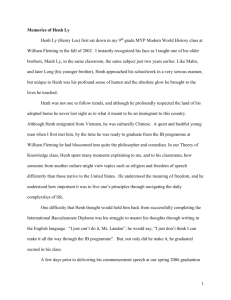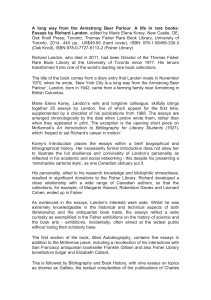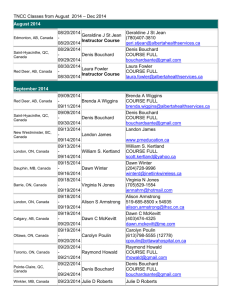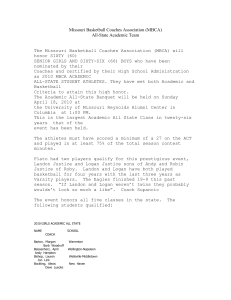Environmental Awareness & Action at Landon
advertisement
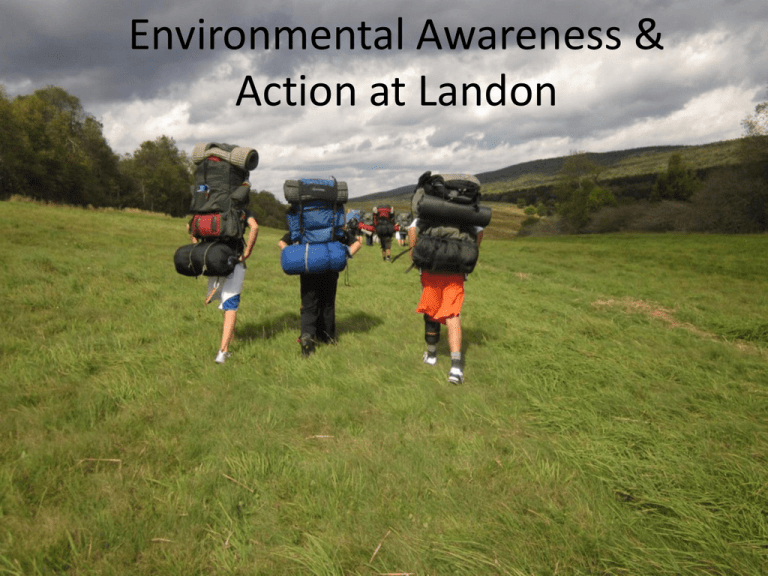
Environmental Awareness & Action at Landon Background Landon School has taken actions to encourage responsible environmental practices and to foster stewardship of the environment among its community – students, faculty, and families. Outdoor education, advisory recycling, green grounds keeping practices, trayless lunches, . . . Environmental Values Statement Last year David Armstrong asked a group of faculty to oversee an effort to look into all areas of School life to create Landon’s Environmental Values Statement to articulate Landon’s commitment to environmental stewardship. Process • During the process we looked into a variety of areas – Curriculum, Waste Reduction and Conservation Efforts, Buildings, Grounds & Transportation, and Food Services. • Faculty and parents were involved and their input and feedback was incorporated in the statement. Environmental Values Statement Landon School promotes environmental literacy and sustainable practices throughout our community. As stated in the School’s strategic plan, Landon fosters leadership and innovation by cultivating “responsible stewards of the natural environment and Earth’s resources.” Landon is committed to promoting environmentally responsible behavior both within and beyond our campus by reducing waste, conserving resources, decreasing pollutants, and maximizing recycling. To allow our students to become resourceful and creative leaders in our changing world, we are dedicated to advancing ecological awareness and literacy as well as environmental activity both in the classroom and through extracurricular activities. 8 Goals 1. Foster the community’s understanding of ecological issues and our environmental impact. 2. Reduce resource waste in all areas of school life. 3. Reduce the School’s carbon footprint and energy costs; increase energy efficiency and reduce water use in buildings. 4. Improve indoor air quality. 5. Implement environmentally sound land-management practices, and encourage the academic use of our campus 6. Reduce negative environmental consequences related to transportation issues on and off campus. 7. Engage in environmentally sustainable practices in our food services at Landon. 8. Promote a commitment to environmental sustainability by administrators, faculty and staff. Sample - Implementation • Goal 2: • Commit to reducing resource waste in all areas of school life. • To implement this goal, Landon will: • a) Create and follow a green purchasing policy to encourage thoughtful purchasing, including considering green products, such as those with a high percentage of recycled content. b) Conduct an energy- and waste-reduction audit of the campus. c) Use technology to reduce the energy costs related to copying, printing, and mailings, and continue to investigate the use of e-textbooks. d) Encourage and manage recycling of all recyclable materials across campus. e) Increase clarity of signs for proper disposal of trash and recyclables. f) Reduce resource waste and increase recycling at all school events. Some things we’ve done • • • • • • • • Outdoor Education in each division Form III Class SEAS and TREES Lower School Green Team Advisory Recycling in the Middle and Upper Schools Green practices in our community events Anti-idling campaign Student environmental logo contest Some things we’re doing • Energy audit • Energy monitoring software • Renovation of our green house and outdoor classroom • Plans for composting • Reconfiguring the cafeteria to do away with cartons and make salads and fruits central • Curricular tie ins • Environmental summer reading Issues • • • • • • • • Culture /Habits/Attitudes Logistics Financial considerations Manpower Student ownership Administrative support Buy in from all/most community members Change Benefits What do independent schools get out of strongly supporting environmental stewardship and sustainability? • Demonstrating responsible citizenship in our communities. • Becoming more mindful of our behavior and its impact on the environment and natural resources. • Fostering an appreciation of the natural world and the importance of conservation in our students. • Saving energy and resources. • Helping promote waste reduction and responsible consumption. • Educating students and community members to become make informed and intelligent decisions and understand their place in the world.

